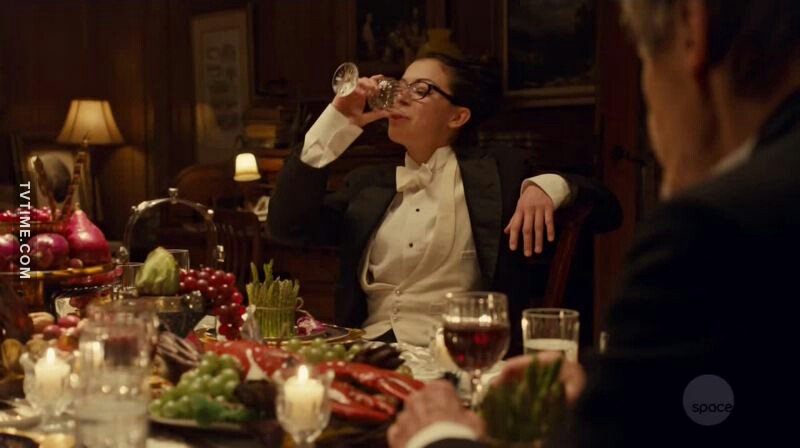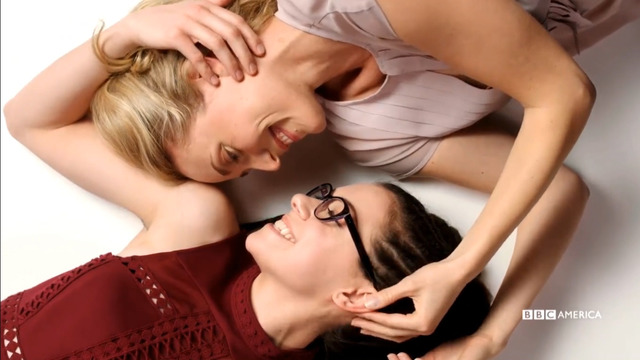Spoiler warning: Major spoilers for all aired episodes of Orphan Black, specifically episode 5×05.
The latest episode of Orphan Black, episode 5×05, “Ease for Idle Millionaires,” has been highly anticipated by all of the Cophine stans in our little fandom, myself included. It centers on Cosima, my personal favorite clone due to her queer scientist superpowers and unfailing earnestness, and by extension we get a lot of Delphine, making this episode the best/worst/but actually the best thing I’ve seen since Delphine waxed poetic in an “oddly romantic and totally encouraging” way about sexuality and how much she couldn’t stop thinking about “that kiss” in season one.
It contains scenes in which Cosima and Delphine kiss and hold hands while in formalwear that were heavily teased on Orphan Black social media accounts, and lots of fans latched onto the theory that this meant a Cophine wedding. While this didn’t exactly turn out to be the case, it also kind of did, and ultimately I feel very satisfied with what actually happened. It took me a minute to smush my heart back together after it melted and reconnect it to my brain to form semi-coherent thoughts, so four days later here I am.
A lot has happened since that sexuality-speech scene in season one, when Cosima and Delphine became not just Cophine but COPHIIIIIIINE (see: Tatiana is Everyone for correct squeal-pronunciation). And, as Orphan Black is wont to do since last season, in 5×05 we flash back to the beginning again for context.
While present-day Cosima is watching the DNA sequencer she’s working with do its thing in the opening scene of 5×05, she dozes off and remembers the night she and Delphiiiine! sequenced her own genome; the night when she saw, written in her DNA, a patent. In the original scene, which happened in 1×10, this discovery is immediately followed by Cosima confessing to Delphine that she’s sick, and after they get teary and hug, the scene ends. When we flash back to it now, we see more of the immediate aftermath of the double discovery of Cosima being both intellectual property and also potentially/definitely dying.
Cosima gets up, distraught, freaking out about being owned, about how nothing is hers, how they made her sick. Delphine snaps the laptops shut and whispers that none of this matters. Cosima paces, tears welling, continuing to claim she has nothing. Delphine, standing before her now, grabs Cosima’s hand and puts it right on her heart. “You have me,” she says, to which Cosima replies, “You- you were paid to lie to me.” Her voice breaks, and so does the heart of every person watching this unfold.
This is the story of Cophine: they love each other desperately, but both are heavily controlled by circumstance and their own drives. They are ambitious, intelligent, and ruthless in their own ways, ways that clash with each other often. They both have the best intentions and are brimming with love, especially for each other, but they chart the means to their ends very differently. It makes for amazing storytelling, an incredibly compelling romance, and beautifully complex characters.
Delphine weeps, “I’m sorry,” and then grips Cosima’s hand tighter to her chest. She promises Cosima that she will always work to protect her. She says that they don’t own her; they don’t own her integrity, her intellect, her humor. Then she kisses Cosima all over. “Defy them,” she tells her between kisses. “Defy them, live your life with every ounce of passion that I know you have, and they will never own you.” It’s one of the most beautiful and heartbreaking love scenes ever on TV. I’m not biased in this claim at all. (Also, I think we’ll all remember the moment in season one that shortly followed this sad/life-affirming love scene, i.e. when Felix confronts Cosima about “smelling lesbians in my bed” and she says right back, “Look, I’m not going to apologize for my heart, ok?” Still one of my favorite OB moments).

As Cosima wakes from this memory, she is back on the island, still sequencing DNA from “the monster’s” tooth in order to try to uncover what this creature is and what Westmoreland has done to it to turn it violent. Only now, thanks to Virginia Coady in 5×04, we know that “the monster” is actually a man who was brought to the island as a boy. He was from a Latvian orphanage (another orphan exploited for science) and his name is Jannis.
As a child he showed remarkable healing powers that PT, Susan, and Virginia wanted to insert into their Leda (and presumably Castor) clones. These healing powers have to do with the genetic expression of a protein called LIN28-A, which is a real thing that has something to do with tissue repair and regeneration that is mostly produced in embryos. LIN28-A seems to be the locus of PT’s longevity work, but whatever he and his team did to Jannis, it destroyed him.
In fact, at the end of the episode, Cosima bitterly spits at PT that he has dismantled a human being and calls him out for using Jannis to treat himself, though we don’t know specifically what ails PT yet. Cosima also calls bullshit (as she does oh so well) on PT’s claim that he is 170 years old and that his work is focused only on LIN28-A, because “it’s never just about one gene.” And as it turns out, the healing powers of LIN28-A didn’t manifest in the Ledas; but, as we can all deduce, they have showed up in the unexpected next generation: Kira as well as Helena’s unborn babies.
We find out that Rachel (and Susan and PT) are planning the GROSSEST MOST INSANE THING aka harvesting the eggs of A LITTLE GIRL (Kira) and using them to start a new round of human cloning with 1300 SURROGATES. Cosima is as disgusted by this as any person with even a small sense of ethics would be. This apparently makes her “interesting” in the eyes of creepy!PT, who points out her ostensibly paradoxical existence at the intersection of the clinical and the humane. I say, stfu, PT.
With the ever-disturbing plot of Jannis-hunting and next-gen Neolution playing out around Cosima, Delphine returns to the island. This episode has more Cophine scenes than we’ve seen in a *very* long time, despite the fact that their relationship has continuously been very important to the overall narrative of the show (good job working around Evelyne Brochu’s schedule, showrunners; seriously, it proves that it can be done well, so kudos).
There is always a lot of tension between Cosima and Delphine because of the intricate webs of secrecy surrounding Neolution and the fight for the Leda clones’ freedom, but these two women are different in some fundamental ways. Cosima is honest to a fault, driven by her principles, ethics, and insatiable hunger for knowledge to push more, ask more questions, get to the bottom of things. She’s fearless in her pursuit of the truth and of what’s right, and does not quietly play along or allow herself to be intimated. She also can’t keep important secrets.
Delphine, on the other hand, is very good at keeping quiet, at observing, at playing the game, whether it was Leekie’s corporate game, Rachel’s power game, or, now, PT’s twisted Neo game. She is willing to let the old men at the top feel like they have power over her in order to learn their secrets. Delphine believes—and is probably right about this—that secrecy and discretion is extremely important to the end game, so she withholds information from Cosima because of Cosima’s tendency to not be discreet. This is a huge sticking point in their relationship. It’s clear that everything Delphine does is for Cosima, but Cosima, understandably, can’t always see it that way when she’s being lied to or kept in the dark.
I’m not justifying all of Delphine’s methods. She often isn’t fair to Cosima, and does, in the Neo world, hold a lot more power than Cosima does. The power dynamic was off balance from the start, as Delphine came into Cosima’s life in an orchestrated way, to monitor her. That’s problematic to say the least, but the love that grew from it has blossomed into one of the best queer woman portrayals on TV. That’s because it’s complicated and messy. It’s also very much rooted in the characters themselves, who are autonomous and complex and empowered within themselves, even when corporations or mysterious high-up figures (clear metaphors for the patriarchy) hover above them and control their circumstances.
Orphan Black has always been explicit in challenging the patriarchy, putting women at the center of an entire (incredibly good) 5-season series and never wavering. In this final season, the narrative is truly built around taking that patriarchy down. PT Westmoreland represents the head of the patriarchal monster, and that is made even more clear in this episode.
A large chunk of “Ease for Idle Millionaires” takes place at a formal dinner in PT’s house, at which Susan, Ira, Rachel, and Delphine are present; Cosima invites herself (again, fearless). When The Messenger leads Cosima and Delphine to a room in the house filled with a bunch of old lacy dresses and tells them to dress up for dinner, Cosima is not pleased. Delphine grabs her arm and tells The Messenger, “We’ll dress.” Cosima looks at one of the dresses and says, “Frock that,” which is so very Cosima and one of the many one-liners that has made her so endearing over the course of the series.
When the pair walk into the foyer, Delphine is wearing one of those lacy white gowns and Cosima is in a full tux, and I am HERE FOR IT. They’re holding hands, and The Messenger says, “This is not appropriate,” to which Cosima shoots back, “It’s totally appropriate.” GET IT COSIMA. Delphine is clearly nervous about what Cosima will do at this dinner but she’s determined to push forward so she goes to see PT in another room, since he has asked for her.
Cosima is obviously over Delphine playing into the hands of gross old men who want to control women’s lives and bodies. The look they exchange when Delphine shows up a few minutes later arm in arm with PT is both wrenching and a joy to watch. Cosima is not ok with it; Delphine stares quietly into her eyes as if to say, “Please play along, we need to play along.”

During the dinner, Cosima is extremely cheeky, to use Delphine’s word. She downs a lot of wine and talks about how many dead things PT has in his house and spills everything she’s found out about his work so far.

Delphine stays quiet the whole time, but Evelyne Brochu is wonderful with her facial expressions. Like in the dinner scene with Leekie in season one, her face shows just how much she can’t resist cheeky Cosima. While she is cautious, she very clearly loves it.

PT brings up that Delphine told him Cosima was in his basement, and this is not going to go over well. Just then a clock chimes and suddenly Delphine and Rachel need to catch a helicopter off of the island. As Delphine gets up, so does Cosima, and PT says exasperatedly, “See her out of you wish!” And then we cut to Cophine upstairs.
Cosima is livid that Delphine threw her under the bus with PT, and as Delphine quickly strips the ridiculous dress off, she tries to explain that she had to tell him something so that he would still let her go to Geneva. Cosima is reeling, not understanding why Delphine has to go to Geneva, why she has to be kept so deep in the dark. Delphine says Felix and Adele are there but that giving her more information would compromise the end game.
Cosima is having none of it when Delphine grabs her hand, clutching it to her chest just as she did in the flashback scene. “Do you remember when you told me you were sick?” she asks, and Cosima gets quiet. Still holding Cosima’s hand to her heart, Delphine goes on, “I made a promise. I promised to protect you.” “And I promised to defy them,” Cosima says quietly. We start to see the flashback scene layered into the present scene. “This is what we do,” Cosima continues. “I push too hard and you do things without my consent. That’s our relationship.”
“Yes,” says Delphine. “Now we can end it, or we can accept it as it is.” Cosima steps forward and kisses Delphine, and the camera circles them, cutting between then and now. It’s very effectively edited to show how desperately these two love each other and how charged that love has been. Delphine pulls away and says, “That felt like acceptance.” Cosima doesn’t look away; she looks right into her eyes and says, “Yes.”
Sounds like a commitment to me.
A note about this dialogue. I see what the writers were trying to do here, or at least I think I do. The way I interpret it, the point was to state simply that the Cophine relationship is not perfect but that they are committed to each other anyway. This intention is actually fantastic and extremely rare in queer representation. We almost never see real-life levels of messy and imperfect in queer relationships as portrayed in pop culture, and it’s important that Orphan Black is creating that.
But, I don’t like the words they chose. “Push too hard” and “do things without my consent” are very problematic behaviors to just accept. I would hope that these characters would actually work on those things rather than just make them the status quo, and from what we’ve seen of these women over four and a half seasons, I have faith that they will. So, despite not being a fan of the specific way in which this “acceptance” was framed, I’m willing to overlook it on the assumption that what they’re really accepting is each other, flaws and all.
The way in which this commitment scene ended says a lot about what the fight for freedom has been about for the Leda clones and their closest allies and families. Cosima looks softly at Delphine and sighs, “This is what he does. He divides women.” Referring, of course, to PT. If that’s not a blatant metaphor for the patriarchy, no such thing exists. Delphine responds, “So go out there, and act like he’s divided us.” At this, Cosima smiles. While she has never been so willing as Delphine to quietly play along in patriarchal schemes, and is in fact pretty terrible at lying, she feels reaffirmed that she and Delphine are a team, and secure in the knowledge that Delphine has in fact been keeping her promise to Cosima all of this time and will continue to act out of love for her.
This scene, for me, is where the not-wedding-but-actually-wedding happened. I’m not disappointed that it wasn’t an official wedding because what I really wanted was commitment between these two characters. That doesn’t have to mean they actually get married and go through a ceremony. That’s mostly pomp. In fact, now that I’ve seen this much-speculated-over tux-and-dress scene, I’m happier with how it actually played out. The formalwear implies ‘wedding,’ and the commitment is there. The promise to protect, to defy the forces that seek to divide them, to accept one another and their flaws. Even the story Cosima told at dinner about her family gave a sense of her parents, who love and support her, being present. In an important sense, it was a wedding. The love between these women is complicated and fraught, but damn if it’s not also the deepest most true love of any recent TV romance.


